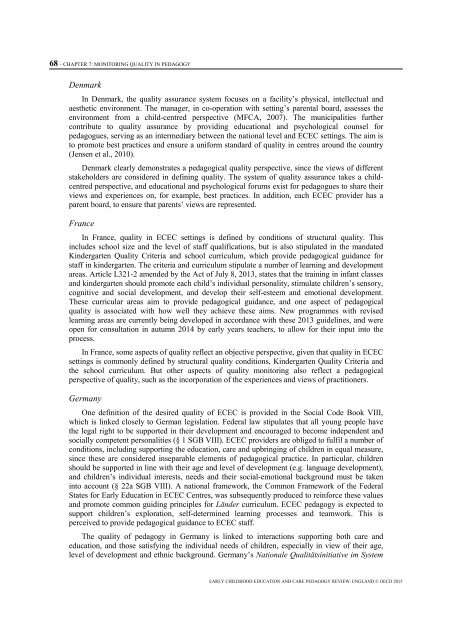early-childhood-education-and-care-pedagogy-review-england.pdf?utm_content=bufferb49b1&utm_medium=social&utm_source=twitter
early-childhood-education-and-care-pedagogy-review-england.pdf?utm_content=bufferb49b1&utm_medium=social&utm_source=twitter
early-childhood-education-and-care-pedagogy-review-england.pdf?utm_content=bufferb49b1&utm_medium=social&utm_source=twitter
You also want an ePaper? Increase the reach of your titles
YUMPU automatically turns print PDFs into web optimized ePapers that Google loves.
68 – CHAPTER 7: MONITORING QUALITY IN PEDAGOGYDenmarkIn Denmark, the quality assurance system focuses on a facility’s physical, intellectual <strong>and</strong>aesthetic environment. The manager, in co-operation with setting’s parental board, assesses theenvironment from a child-centred perspective (MFCA, 2007). The municipalities furthercontribute to quality assurance by providing <strong>education</strong>al <strong>and</strong> psychological counsel forpedagogues, serving as an intermediary between the national level <strong>and</strong> ECEC settings. The aim isto promote best practices <strong>and</strong> ensure a uniform st<strong>and</strong>ard of quality in centres around the country(Jensen et al., 2010).Denmark cl<strong>early</strong> demonstrates a pedagogical quality perspective, since the views of differentstakeholders are considered in defining quality. The system of quality assurance takes a childcentredperspective, <strong>and</strong> <strong>education</strong>al <strong>and</strong> psychological forums exist for pedagogues to share theirviews <strong>and</strong> experiences on, for example, best practices. In addition, each ECEC provider has aparent board, to ensure that parents’ views are represented.FranceIn France, quality in ECEC settings is defined by conditions of structural quality. Thisincludes school size <strong>and</strong> the level of staff qualifications, but is also stipulated in the m<strong>and</strong>atedKindergarten Quality Criteria <strong>and</strong> school curriculum, which provide pedagogical guidance forstaff in kindergarten. The criteria <strong>and</strong> curriculum stipulate a number of learning <strong>and</strong> developmentareas. Article L321-2 amended by the Act of July 8, 2013, states that the training in infant classes<strong>and</strong> kindergarten should promote each child’s individual personality, stimulate children’s sensory,cognitive <strong>and</strong> social development, <strong>and</strong> develop their self-esteem <strong>and</strong> emotional development.These curricular areas aim to provide pedagogical guidance, <strong>and</strong> one aspect of pedagogicalquality is associated with how well they achieve these aims. New programmes with revisedlearning areas are currently being developed in accordance with these 2013 guidelines, <strong>and</strong> wereopen for consultation in autumn 2014 by <strong>early</strong> years teachers, to allow for their input into theprocess.In France, some aspects of quality reflect an objective perspective, given that quality in ECECsettings is commonly defined by structural quality conditions, Kindergarten Quality Criteria <strong>and</strong>the school curriculum. But other aspects of quality monitoring also reflect a pedagogicalperspective of quality, such as the incorporation of the experiences <strong>and</strong> views of practitioners.GermanyOne definition of the desired quality of ECEC is provided in the Social Code Book VIII,which is linked closely to German legislation. Federal law stipulates that all young people havethe legal right to be supported in their development <strong>and</strong> encouraged to become independent <strong>and</strong>socially competent personalities (§ 1 SGB VIII). ECEC providers are obliged to fulfil a number ofconditions, including supporting the <strong>education</strong>, <strong>care</strong> <strong>and</strong> upbringing of children in equal measure,since these are considered inseparable elements of pedagogical practice. In particular, childrenshould be supported in line with their age <strong>and</strong> level of development (e.g. language development),<strong>and</strong> children’s individual interests, needs <strong>and</strong> their social-emotional background must be takeninto account (§ 22a SGB VIII). A national framework, the Common Framework of the FederalStates for Early Education in ECEC Centres, was subsequently produced to reinforce these values<strong>and</strong> promote common guiding principles for Länder curriculum. ECEC <strong>pedagogy</strong> is expected tosupport children’s exploration, self-determined learning processes <strong>and</strong> teamwork. This isperceived to provide pedagogical guidance to ECEC staff.The quality of <strong>pedagogy</strong> in Germany is linked to interactions supporting both <strong>care</strong> <strong>and</strong><strong>education</strong>, <strong>and</strong> those satisfying the individual needs of children, especially in view of their age,level of development <strong>and</strong> ethnic background. Germany’s Nationale Qualitätsinitiative im SystemEARLY CHILDHOOD EDUCATION AND CARE PEDAGOGY REVIEW: ENGLAND © OECD 2015



